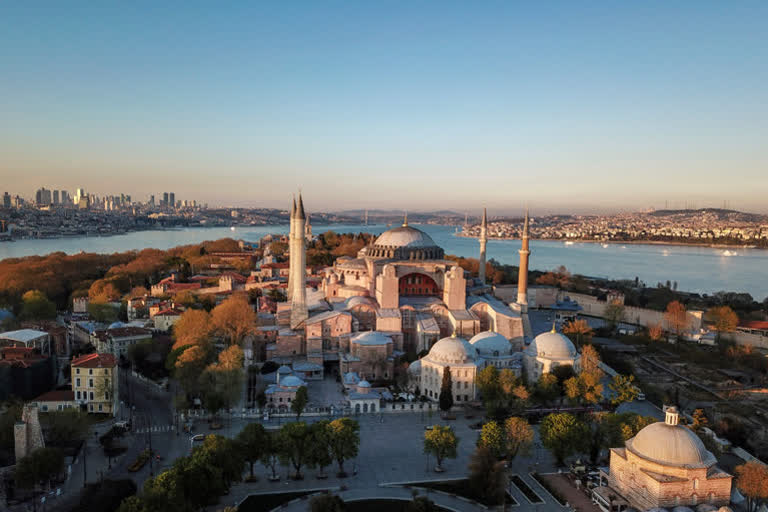New Delhi: There has been a considerable international protest over the Turkish president’s decision to revert Istanbul’s iconic Hagia Sophia into a mosque, a decision which hits at the very foundation of the modern Turkish state, envisioned in the early twentieth century by Kemal Ataturk, the founder of modern Turkey. A slew of governments, from neighbouring Greece to the United States, European Union and Russia, issued notes of concern and protest, while the Pope in the Vatican said he was “deeply pained” and UNESCO warned that the nature of the shrine’s world heritage status could be placed in doubt or even reversed and urged caution against “any decision that might impact the universal value of the site.”
However, from July 24, the Hagia Sophia will reopen its doors to worshippers, and Friday prayers will be held inside this monumental structure.
Promptly after Turkey's highest administrative court unanimously revoked a 1934 cabinet decision to make the Hagia Sophia a museum, President Recep Tayyib Erdogan on July 10 signed into law the conversion of the magnificent sixth-century Byzantine church building back into a mosque and declared it open for Muslim worship. The Hagia Sophia, a major attraction of Istanbul, which itself stands at the crossroads of Europe and Asia and, indeed, as a symbol of western and eastern civilizations, was built as a church, then turned, at the height of the Ottoman empire, into a mosque and, after Ataturk’s rise to power, converted into a museum. It has universally been considered a symbol of Turkish secularism.
India, however, has not been part of the chorus of global protests, from the White House to the Kremlin and the EU. Given that Erdogan has sought to project himself as another pole in the global Islamic leadership stakes, rivalling Saudi Arabia and Iran and, particularly over the past one year, has used global forums to repeatedly bait and criticise India, first over the decision to revoke Article 370 of the Indian Constitution in Jammu & Kashmir and, more recently, for causing a “massacre” of Muslims in the riots in Delhi, it would be expected that India would use the opportunity to criticise Erdogan for his decision to revert Hagia Sophia to a mosque.
"A country which calls itself strong because of its large population, but is not," Erdogan said about India, even as he enhanced defence sales to Pakistan, and joined Malaysia in criticising India.
READ:US upset over Turkey converting historic Hagia Sophia into mosque
New Delhi had lashed out then at Erdogan, saying his remarks "reflect neither an understanding of history nor the conduct of diplomacy...They distort events of the past to advance a narrow-minded view of the present," the Ministry of External Affairs had said.
